THE LANCASHIRE LOOMINARY
An occasional update No. 8 June 2022
Greetings on the first day of June and congratulations to Bradford on becoming next year’s ‘city of culture’. This issue of ‘Th’Loominary’ covers Walt Whitman in Lancashire, new publications on the go and the life of a very eminent Lancashire woman, Sarah Reddish.
Last Train from Blackstock Junction – arriving in September
The late 1960s saw hundreds of stations close as the Beeching Axe descended. ‘Last Train from Blackstock Junction’ is the fictionalised account of one, in the North of England. It’s the title story of a collection of short stories to be published by Platform 5 Publications (the people who do Today’s Railways and much more), hopefully in September. There will be 12 stories in all, covering aspects of railway life in the North-West from the early 1900s to the present day. It’s a lot more than an ‘enthusiast’ book. It deals with difficult issues of racism and sexism, the early days of the labour movement and trade unionism on the railways. The stories aim to be readable and challenging. There’s a couple of ghost stories too. Sir Peter Hendy, chair of Network Rail, has written a very complimentary foreword. More information soon; it will be attractively priced.
Lancastrians, oh Lancastrians!
My other big project is at the construction stage – a full-length history of Lancashire and cultural identity. The main title is Lancastrians but still working on a sub-title. It will be published in summer 2023 by London-based Hurst, who recently brought out Northumbrians by Dan Jackson (see https://www.hurstpublishers.com/book/the-northumbrians/). Chapters will cover the shape – and shaping – of Lancashire, which I take to mean Lancashire as was, about 1900, before it was butchered by ill-thought reform. Other chapters deal with sport, literature and the arts, public health, self-help, politics, work and play, Lancastrians at war. It will deal with the ‘new Lancastrians’ – immigrants into Lancashire over the last three centuries and also ‘Lancastrians abroad’ – the Lancashire people who left for a better life, to countries such as the USA, Australia, Canada – and Russia, which has pockets of ‘Lancashire’ around Moscow. The book ends with a look at whether people in ‘historic Lancashire’ still identify as ‘Lancastrians’ or whether our identities have been merged into a suburban mess of ‘Greater Manchester’ or ‘Liverpool City Region’. I hope not.
Bolton celebrates Walt Whitman’s birthday
Over a century ago Allen Clarke wrote “It is fitting that Bolton should be distinguished above all towns in England by having a group of Whitman enthusiasts, for many years in touch by letter and visit, with ‘the Master’, for I am sure Walt Whitman, the singer of out-door life, would have loved to ramble our Lancashire moorlands.”
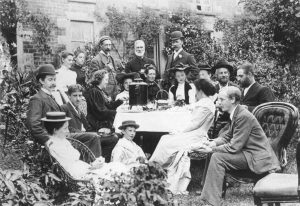
Each year, since 1885, the great American poet’s birthday – May 31st – has been celebrated by generations of Bolton ‘Whitmanites’. This year Bolton Whitman lovers were joined by academics and artists from the USA to celebrate America’s great poet. Why Bolton? Towards the end of his life, Whitman (1819-1892) developed a close friendship with a small group of admirers in the town. They jokingly called themselves ‘The Eagle Street College’ after the modest two-up two-down terraced house on Eagle Street, off Bury Road. The group’s mentor, J.W. Wallace, an architect’s assistant, lived there with his parents in the mid-1880s. He worked all his life for the Bolton firm of Bradshaw Gass and Hope which designed many of the town’s finest buildings; a plaque celebrating Wallace’s life is displayed outside the firm’s offices on Silverwell Street. Bolton Museum is currently hosting an exhibition about the firm which includes photographs of Wallace.
Wallace moved out to Adlington as his health deteriorated, buying a house on Babylon Lane to escape from Bolton’s industrial pollution. The group started a new lease of life in these more rural surroundings, with frequent walks around Rivington and Anglezarke.
Wallace’s friend and fellow ‘Whitmanite’ Dr John Johnston had extensive connections in Bolton society, including Bolton Lads’ Club and the Labour Church. The highlight of the group’s year was Whitman’s birthday, May 31st. Members of the group took the train out from Bolton to Adlington and walked up to Rivington for a garden party hosted by the Unitarian vicar, Samuel Thompson. Readings from Leaves of Grass were followed by a speech from Wallace. A ‘loving cup’, a gift from Whitman’s American friends, was passed around the assemblage, containing ‘spiced claret’. Members of the party sported lilacs in their jackets, Whitman’s favourite flower immortalised in his elegy on the death of Lincoln, ‘When Lilacs Last in the Dooryard Bloomed’.
Both Johnston and Wallace visited Whitman at his home in New Jersey. Whitman himself sent regular messages to the Bolton group and described them as ‘staunch tender fellows’. The group built up a strong relationship with many of Whitman’s American friends which continued decades after the poet’s death. It is perpetuated in the links today between Bolton and American Whitman scholars who are regular visitors to the town. These links are stronger than ever.
The annual walk took place on Saturday May 28th from the Barrow Bridge bus terminal . Nearly thirty people from as far afield as San Francisco, New Jersey, Hampstead and Farnworth joined the walk. The walk began with a fine rendition of the beginning of ‘Song of the Open Road’ by Karen Karbiener of New York. More poems were read en route and cups of wine were passed round. In the evening there was a special event in the Central Library. Whitman on the Walls! was a British-US collaboration featuring seven short films made by Compagnia de’ Colombari from New York, with over 50 global actors performing parts of Walt Whitman’s ‘Song of Myself.’ Local poets and signers added to what was a very special night.
Paul’s booklet ‘With Walt Whitman in Bolton: spirituality, sex and socialism in a Northern mill town’ – is still available. See www.lancashireloominary.co.uk or below. (From Bolton News)
A neglected Lancashire Hero: Sarah Reddish
Sarah Reddish was one of the North’s most outstanding campaigners for women’s rights. She was a co-operator, socialist and so much more. Plans are afoot to celebrate her memory.
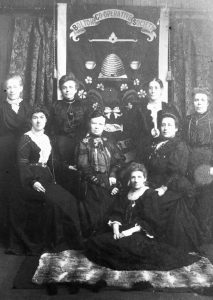
She was born in Leigh in 1849 and left school at the age of 11 to work at home with her mother, a silk weaver. Her father was active in the Co-operative Movement and the family moved to Bolton where he became librarian and secretary to the Bolton Co-operative Education Committee. His co-operative principles rubbed off on his daughter.
Sarah went on to work as a winder and reeler in the local mills and eventually became a forewoman in a hosiery mill. Most of her busy life was devoted to the Co-operative movement, but she was also prominent in the women’s suffrage campaign and the Independent Labour Party (ILP). She was a popular public speaker and she travelled around the country with the first women’s ‘Clarion Van’ tour of 1896, inspired by Robert Blatchford’s popular ‘Clarion’ newspaper. From the back of the horse-drawn van, Sarah and her sisters propounded the new gospel of socialism, to audiences which varied from bemused and hostile to enthusiastic.
In 1899 she was appointed part-time organiser of the Women’s Trade Union League. She founded the Bolton branch of the Co-operative Women’s Guild and she was the national President for many years. She organised a demonstration on the steps of Bolton Town Hall to protest against the money being spent on the coronation of Edward VII, suggesting the money would have been better spent on feeding the poor. She was the first woman on the Bolton Education Board 1899 and later was elected to the Poor Law Guardians. She was the first woman to stand for Bolton Council, representing women’s organisations in the town, in 1907. She polled 737 votes but was not elected.
One of her most outstanding contributions to Bolton was her work for better childcare facilities. In 1906 she travelled to Ghent and Brussels to study child care initiatives being launched by co-operative societies. On her return she established a ‘School for Mothers’ in Bolton to provide support for working class mothers, naming it ‘Babies Welcome’ to avoid appearing to be condescending to the women who used it. It proved to be very successful and eventually eight centres were opened, leading to a dramatic reduction in child mortality in Bolton.
She died, at the age of 78, on February 19, 1928 and is buried at Heaton Cemetery.
She was an active member of Bolton Socialist Club which survives to this day; its members are keen to do more to celebrate her contribution. Chris Chilton, chair of the Club, said: “Sarah Reddish is Bolton’s unsung hero. Her work in the Women’s Cooperative Guild, the trade union movement, the women’s suffrage movement and especially in public health has had as significant an impact on the lives of the working people of Bolton as any of those, predominantly male, figures honoured in statues, portraits and history books. Yet her only memorial is her gravestone in Heaton cemetery. It’s time she was given the recognition she truly deserves.”
Moves are afoot to establish a permanent memorial to Sarah. “We’re still in discussion about the exact form of the memorial,” said Chris Chilton, “though a plaque is the most likely. Another possibility is an annual ‘Sarah Reddish Lecture’. A further possibility, subject to funding, is getting a researcher to collate all the different sources of information about her into a single publication.”
Anyone interested in contributing to a memorial for Sarah Reddish, or helping in the campaign, should contact Chris at chris_chilton@hotmail.com
My book Moorlands, Memories and Reflections features Sarah’s work for the Women’s Co-operative Guild. See www.lancashireloominary.co.uk or below (edited excerpts from Bolton News June 1st)
The latest Salvo no. 303
Here’s the latest ‘Northern Weekly Salvo’, featuring a neglected Lancashire composer, Thomas Pitfield as well as musings on Great British Railways and where to put it (we should hear which towns are on the shortlist very soon).
http://lancashireloominary.co.uk/index.html/1107-2
Allen Clarke biography – special offer!
The new and updated edition of my biography of Allen Clarke (Allen Clarke – Teddy Ashton – Lancashire’s Romantic Radical) is now available at a special price to Loominaries for £10 plus £3 post (or free personal 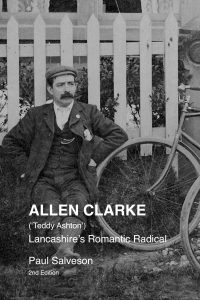 delivery). The book is substantially up-dated from the 2009 edition and has a lot of new material in it, including an entirely new chapter on Clarke’s railway writings. You can download an order form from my website, below, or there’s one at the back of this newsletter: http://lancashireloominary.co.uk/index.html/order-form. It is available on kindle price £8.99
delivery). The book is substantially up-dated from the 2009 edition and has a lot of new material in it, including an entirely new chapter on Clarke’s railway writings. You can download an order form from my website, below, or there’s one at the back of this newsletter: http://lancashireloominary.co.uk/index.html/order-form. It is available on kindle price £8.99
Moorlands, Memories and Reflections
2020 was the centenary of the publication of Allen Clarke’s Moorlands and Memories, sub-titled ‘rambles and rides in the fair places of Steam-Engine Land’. It’s a lovely book, very readable and entertaining, even if he sometimes got his historical facts slightly wrong. It was set in the area which is now described as ‘The West Pennine Moors’ It also included some fascinating accounts of life in Bolton itself in the years between 1870 and the First World War, with accounts of the great engineers’ strike of 1887, the growth of the co-operative movement and the many characters whom Clarke knew as a boy or young man.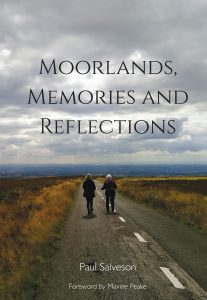
My book is a centenary tribute to Clarke’s classic – Moorlands, Memories and Reflections. It isn’t a ‘then and now’ sort of thing though I do make some historical comparisons, and speculate what Clarke would have thought of certain aspects of his beloved Lancashire today. There are 28 chapters, covering locations and subjects which Clarke wrote about in the original book, with a few additions. It includes the Winter Hill rights-of-way battle of 1896 and Darwen’s ‘freeing of the moors’; a few additional snippets about the Bolton ‘Whitmanites’, handloom-weaving, railway reminiscences, the remarkable story of ‘The Larks of Dean’ and Lancashire’s honourable tradition of supporting refugees (including the much-loved Pedro of Halliwell Road). The story of Lancashire children’s practical support for the locked-out quarryworkers of Snowdonia in 1900-3 is covered in some detail, including the remarkable ‘Teddy Ashton Picnic’ of 1901 in Barrowbridge, which attracted 10,000 people. It is well illustrated.
It is available for Loominaries reading this at £20, with £4 post and packing. Go to http://lancashireloominary.co.uk/index.html/order-form or use order form below
I can do free delivery locally (within about 6 miles of Bolton).
The Works: a tale of love, lust, labour and locomotives
I’ve had a steady flow of orders for The Works, my novel set mostly in Horwich Loco Works in the 1970s and 1980s, but bringing the tale up to date and beyond – a fictional story of a workers’ occupation, Labour politics, a ‘people’s franchise’ and Chinese investment in UK rail. I’ve
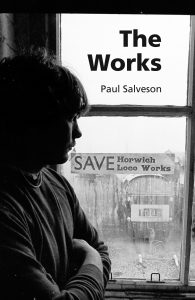
had lots of good reactions to it, with some people reading it in one session. The Morning Star hated it. If you want a copy I can offer it for £5 plus £2.50 postage to those of you on this mailing list. Please make cheques payable to ‘Paul Salveson’ and post to my Bolton address above or send the money by bank transfer (a/c Dr PS Salveson 23448954 sort code 53-61-07 and email me with your address). If you are local I can do free delivery by e-bike (so just a tenner). There is a kindle version available price £4.99 and you can also buy it off Amazon. See www.lancashireloominary.co.uk
The Works is available in a range of outlets – please support them, and see www.lancashireloominary for details of their location, ranging from Bolton and Horwich to Carnforth, Barrowford, Machynlleth and Bo’ness.
If you know of any local shop which might like to take my books please let me know. I do a third discount, sale or return.
Still in print: previous publications
The Settle-Carlisle Railway (2019) published by Crowood and available in reputable, and possibly some disreputable, bookshops price £24. I have a few which I can offer with £4 postage. It’s a general history of the railway, bringing it up to date. It includes a chapter on the author’s time as a goods guard on the line, when he was based at Blackburn in the 1970s. It includes a guide to the line, from Leeds to Carlisle. Some previously-unused sources helped to give the book a stronger ‘social’ dimension, including the columns of the LMS staff magazine in the 1920s. ISBN 978-1-78500-637-1
With Walt Whitman in Bolton – Lancashire’s Links to Walt Whitman. This charts the remarkable story of Bolton’s long-lasting links to America’s great poet. Normal price £10.00, now selling for £6.00. Bolton’s links with the great American poet Walt Whitman make up one of the most fascinating footnotes in literary history. From the 1880s a small group of Boltonians began a correspondence with Whitman and two (John Johnston and J W Wallace) visited the poet in America. Each year on Whitman’s birthday (May 31) the Bolton group threw a party to celebrate his memory, with poems, lectures and passing round a loving cup of spiced claret. Each wore a sprig of lilac in Whitman’s memory.
The group was close to the founders of the ILP – Keir Hardie, Bruce and Katharine Bruce Glasier and Robert Blatchford. The links with Whitman lovers in the USA continue to this day. Later this summer (see above) I’ll be bringing out an expanded version which has more on the wider political context – Unlikely Pioneers: Walt Whitman, The Bolton Boys and Northern Socialism.
Ordering:
http://lancashireloominary.co.uk/index.html/order-form or see over….
Other titles still available:
Socialism with a Northern Accent (Lawrence and Wishart)
This was my take on a progressive Northern regionalism, with a foreword by the much-maligned but admirable guy, John Prescott. Time for a new edition – working on it
Railpolitik: bringing railways back to communities (Lawrence and Wishart)
109 Harpers Lane BOLTON BL1 6HU
Phone: 07795 008691 email: paul.salveson@myphone.coop
ORDER FORM 2022 (including Special Offers)
Name………………………………………………………………………………………………..
Delivery Address……………………………………………………………………………………………………………………..
…………………………………………………………………………………………………………Post code…………………….
Phone…………………………………………………………………………….email………………………………………………
| Quantity | Title | Price ( + delivery) |
| The Works (special offer) | 5.00 + £3 | |
| Allen Clarke/Teddy Ashton: Lancashire’s Romantic Radical (new edition) (normal price £18.99) | 10.00 + £3 | |
| With Walt Whitman in Bolton (special offer) | 6.00 + £3 | |
| Moorlands, Memories and Reflections | 15.00 + £4 | |
| The Settle-Carlisle Railway | 24.00 + £4 | |
| Total |
Bundles by negotiation! If ordering more than 1 book postage is £4 in UK. Local delivery is by Bolton Bicycling Bookshop, otherwise Royal Mail. Enquire for overseas rates.
Send cheque for total amount made to ‘Paul Salveson’ to 109 Harpers Lane, Bolton BL1 6HU.
If paying by BACS the account details are:
Dr P S Salveson (it’s a personal account) sort code 53-61-07 A/C no. 23448954. Email me with your order details and put your name and book e.g. ‘MMR’ or ‘Works’ as the reference when paying.
I’m happy to sign books, but please let me know (and to whom, if you want a specific dedication).
Many thanks for your support. Paul
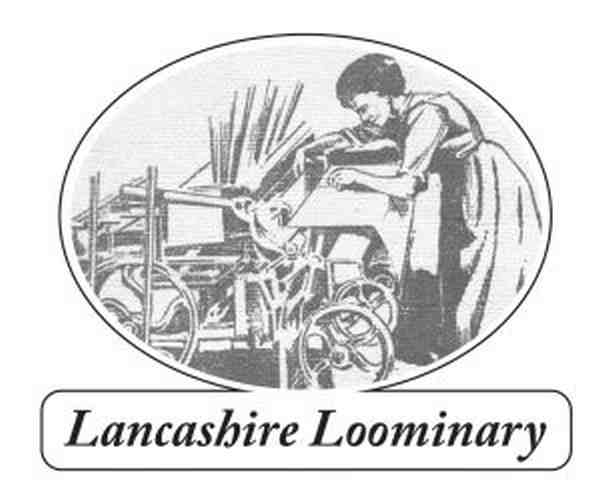
2 replies on “The Lancashire Loominary No. 8”
Thanks for another edition with some fascinating events from local labour history – and, thankfully, no references to the modern ‘Labour’ Party, which requires only your funeral oration over its’ corpse.
Can you let me know the meeting place in Bolton for Walt Whitman’s Birthday Celebration please. Or details of membership?
I am completing research as new to the works of this ‘wonderful poet’.
I live in North Wales – born in Cheshire just next door to Lancashire!
Thank you in advance.
Pat Wellock